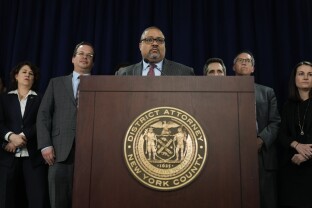Donald Trump isn’t getting sentenced in New York anytime soon, with local prosecutors effectively pausing the hush money case as they fight off the president-elect’s attempts to dismiss his criminal conviction altogether.
Manhattan District Attorney Alvin Bragg Jr. indicated his team will continue to back the jury’s guilty verdict even after he returns to the White House. Though, Bragg’s office also showed an openness to a four-year freeze, until Trump — who will become the first felon ever to serve as president — is done with his term.
“The people deeply respect the office of the president, are mindful of the demands and obligations of the presidency, and acknowledge that defendant’s inauguration will raise unprecedented legal questions. We also deeply respect the fundamental role of the jury in our constitutional system,” Bragg wrote in a letter to the court Tuesday.
“Consideration must be given to various non-dismissal options … such as deferral of all remaining criminal proceedings until after the end of defendant’s upcoming presidential term,” he added, quoting a 2000 Justice Department memo about presidential protections when noting that “immunity should not lead to consequences that ‘forever thwart the public’s interest in enforcing its criminal laws.’”
With only 62 days until Inauguration Day, it’s unclear what this legal fight will look like. Expect letters, maybe a judicial order, and appeals — but no definitive sentencing. Former prosecutors and judges have told NOTUS there’s no chance Trump could be forced to appear in court for a sentencing after he’s back in office.
Prosecutors had until Tuesday to lay out how they plan to proceed with the case. This morning, Bragg himself authored a letter asking the state court judge to wipe out any remaining deadlines in the case — including a sentencing scheduled to take place next week — so that both sides can duke it out.
“The people believe that further proceedings before this court should be adjourned,” Bragg wrote.
If New York Supreme Court Justice Juan Merchan agrees, the case that was about to reach its much-anticipated conclusion will instead take a circular detour that relitigates one of the basic issues that has dogged every prosecution against Trump thus far: whether prosecutors can chase after him in the first place.
Trump’s felony conviction in New York is only one of several cases currently in limbo.
In Georgia, an indictment against him for 2020 election interference is on pause as a higher court considers whether Fulton County District Attorney Fani Willis should be yanked off the case. In Florida, a federal judge dismissed the indictment that accused Trump of mishandling classified records after she concluded that Justice Department special counsel Jack Smith didn’t have the authority to even bring the case. And in Washington, Smith has already begun to wind down his federal case for election interference, anticipating that Trump will kill the investigation as soon as he takes office.
That leaves only the Manhattan DA’s case, where a jury of 12 New Yorkers in May found that Trump was guilty of 34 felony counts of faking business records in an attempt to cover up a hush money deal that kept porn star Stormy Daniels from exposing their extramarital sexual affair before the 2016 presidential election.
But Tuesday’s letter makes clear that prosecutors and Trump’s defense team are about to spar over whether a president-elect is somehow immune from accountability by the mere nature of his political status.
The DA’s decision to wipe the calendar follows a Nov. 8 letter to the court from Trump defense lawyer Todd Blanche, who wrote that “dismissal is required because a sitting president may not be prosecuted.”
“A sitting president is completely immune from indictment or any criminal process, state or federal, and the same immunity extends to a president-elect during his transition into the presidency,” Blanche asserted.
Trump’s legal team more or less ensured this chaotic final stretch by relentlessly pushing to delay the New York case while simultaneously seeking a friendly ruling from the U.S. Supreme Court on presidential immunity. Defense lawyers have since latched onto that high court ruling by claiming that some evidence should never have been presented at trial, like the fact that Trump was at the Oval Office when he signed checks to his lawyer, Michael Cohen.
In Tuesday’s letter, Bragg acknowledged that his office’s options are few and narrow. He noted that even if the judge keeps the case alive and intends to inch toward sentencing, Trump’s team will surely appeal that decision and halt proceedings anyway.
—
Jose Pagliery is a reporter at NOTUS.
Sign in
Log into your free account with your email. Don’t have one?
Check your email for a one-time code.
We sent a 4-digit code to . Enter the pin to confirm your account.
New code will be available in 1:00
Let’s try this again.
We encountered an error with the passcode sent to . Please reenter your email.


